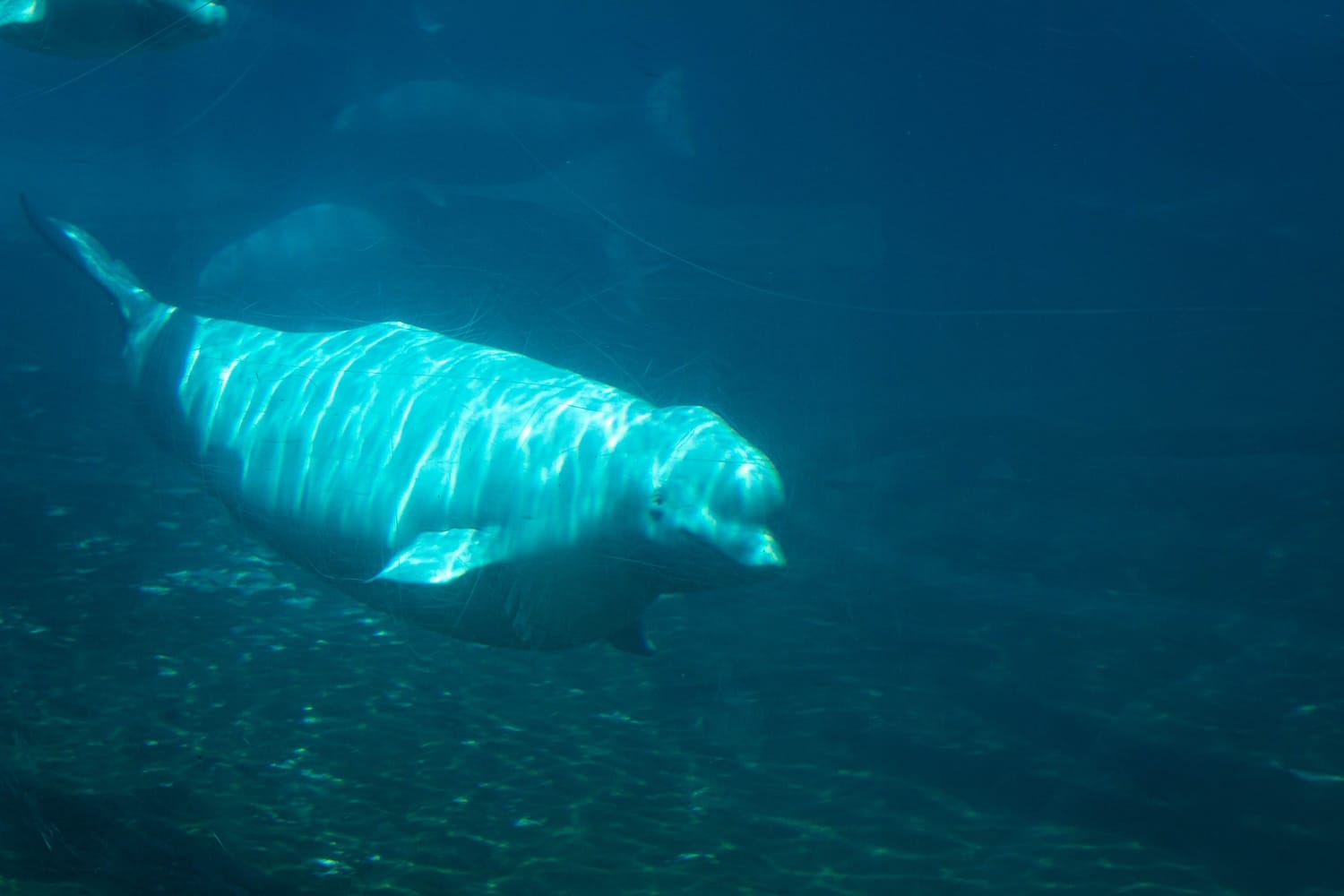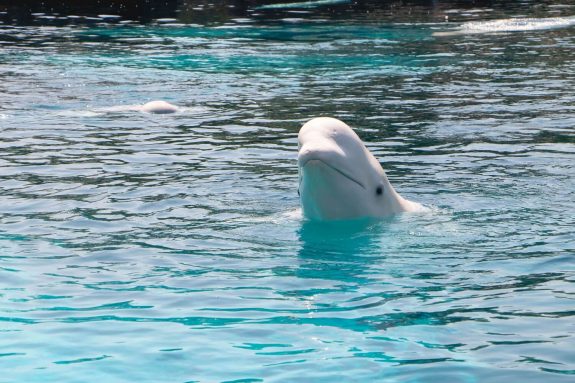Animal Justice is fighting to protect beluga whales at Marineland from potential transfers to subpar facilities that could jeopardize their health or use them for breeding. One facility reportedly under consideration is Chimelong Ocean Kingdom, a large theme park in Hengqin, Zhuhai, China. There, the whales could be used for breeding and performances—activities which are illegal in Canada.
We have sent a letter to the Minister of Fisheries and Oceans outlining our concerns about the potential transfer to Chimelong and urging authorities to ensure that any transfers are in the animals’ best interests. Additionally, we’re requesting that independent medical evaluations are done on all remaining whales and dolphins to ensure they are healthy enough to withstand the stress of lengthy transport.
Ultimately, we’re asking the government to help send as many whales as possible to sanctuaries, including one being developed by the Whale Sanctuary Project’s ocean sanctuary in Nova Scotia—the best possible option for these animals who unfortunately cannot be released into the wild.
In the meantime, we’re calling on authorities in Ontario to urgently improve the living conditions of the animals currently held in Marineland’s tanks. Provincial Animal Welfare Services has reportedly been investigating the facility for years, but more needs to be done to assess animals’ health, bring in caregivers or veterinarians, and improve the tanks in which they are confined. Provincial animal welfare laws allow authorities to take steps such as these to relieve animals’ distress and send the bill for the animals’ care to Marineland.
Neither Marineland nor the federal Department of Fisheries and Oceans (DFO) have disclosed whether export permits have been requested, despite multiple requests for information. What happens to the whales at Marineland is a serious matter of public interest—and this lack of transparency is deeply troubling.

Whale Transfer to China Would Perpetuate Suffering
In 2019, Animal Justice helped support the passage of Bill S-203, which is designed to phase out whale and dolphin captivity due to the heartbreaking suffering these animals endure in tanks. Under Canadian law, it’s now illegal to breed captive whales and dolphins or force them to perform for entertainment.
The Chimelong park in China displays belugas and other animals to the public and has regular beluga shows at its park. This would likely be the fate for any belugas obtained from Marineland.
To make matters even worse, there are zero national animal protection laws in China and it would be extremely difficult for Canadian officials to ensure any whales transported to Chimelong would not be used for breeding or entertainment.
The transport of whales across the world would also pose serious risks to the physical and mental well-being of the animals, especially for the ones already in poor health. In 2021, five of Marineland’s whales were transferred to Mystic Aquarium in Connecticut, even though some were suffering health conditions at the time. Tragically, three of these whales died by the end of 2023.
Marineland Closed & Up For Sale
In February, Marineland received approval from the City of Niagara Falls to split up its property to secure funding from a lender that requires Marineland to swiftly remove its marine animals. Animal Justice lawyers fought to stop the land deal due to the lack of clarity about what this means for the dozens of marine animals still held captive at the facility.
A recent video from June shows the elevated stage used for performances in the pool being demolished, yet animals are still trapped inside the deteriorating tanks. Four dolphins are seen stuck in a cramped, filthy tank, circling the drain next to the demolition. Forty marine mammals including belugas, dolphins, sea lions, and many other land animals are still inside.
As a result of this new footage, Animal Justice has submitted yet another legal complaint to Ontario animal welfare authorities, urging them to investigate and take immediate action to protect the marine mammals confined at Marineland.
Marineland’s History of Deaths & Illegal Cruelty
Since 2019, a shocking 18 belugas, one dolphin, and the lone orca Kiska have died at Marineland.
In March 2024, Marineland was convicted of offences under Ontario’s animal welfare laws for its treatment of three young bears—marking the first time the park has ever been held legally accountable for cruelty.
In 2016, Marineland was charged with five counts of animal cruelty, involving black bears, guinea hens, and a peacock. The following year, six more charges were added for the mistreatment of elk and deer, but all charges were later dropped by the Crown.
Then in 2021, following a complaint by Animal Justice, Marineland was charged with illegally forcing dolphins to perform for entertainment. The charge was unfortunately also dropped by the Crown.
In 2021 and 2022, Animal Justice submitted complaints after disturbing footage emerged of Kiska—known as the world’s loneliest orca while she was alive—violently thrashing against the sides of her tank. Yet no charges were laid.
Tell the Government to Reject Whale Export Permits
Sending whales to Chimelong in China or other far away facilities would force the animals to endure a traumatic transport journey, only to continue to be displayed for entertainment. If the animals were to be bred or forced to perform, this would undermine Canadian laws that aim to end cruelty to whales in tanks and phase out whale captivity altogether.
Before any export permits are issued, independent and thorough health assessments of all animals are needed. It’s important that discussions take place with both levels of government, together with animal protection groups, marine mammal experts, and industry representatives, to identify all available options for the remaining whales and dolphins to improve their health and well-being while ensuring respect for the intention of Canada’s laws against breeding and performances.
Please join us in calling on the government to deny any export permits that put whales and dolphins at risk, and to help send as many whales as possible to sanctuaries.




